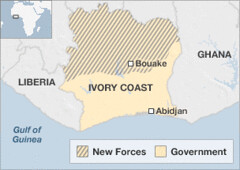
A map of the Ivory Coast that illustrates the military forces loyal to both the incumbent Gbagbo and Ouattara who is supported by the UN and the West. ECOWAS is threatening to enter the country.
Originally uploaded by Pan-African News Wire File Photos
By Orla Ryan in N’douci
Financial Times
February 14 2011 22:28
A worker in blue overalls dozes on bags of cocoa, the chocolate scent of fermented beans lingering in the air.
His sleep is unlikely to be disturbed any time soon. A ban on cocoa exports from Ivory Coast means the five tonnes of cocoa in this humid shed in the busy market town of N’douci could fester for weeks or even for months.
In late January Alassane Ouattara, the internationally recognised winner of a disputed presidential election, banned cocoa exports for one month. That, together with tough European Union sanctions on the country’s ports, has brought the cocoa trade in the world’s biggest producer of the beans to a halt.
Mr Ouattara hopes that stopping exports will loosen the grip on power of Laurent Gbagbo, his rival in the November poll. Mr Gbagbo has refused to leave office, while Mr Ouattara remains under UN protection in the city of Abidjan.
Mr Ouattara has threatened to extend the embargo unless Mr Gbagbo steps down.
Cocoa farmers, traders and exporters are nervous. All the ban has achieved is to make life harder for smallholders, argues Kouakou Hugues Roger, who runs an N’douci co-operative that buys beans from farmers and sells them to exporters.
“They are poor. The farmers have nothing to do with this. But the ban is making them victims,” he says. “If the embargo continues, it will be catastrophic.”
In a nearby depot, middleman Nazir Moroe has 30 tonnes of unsold cocoa and two trucks of beans in Abidjan in search of a buyer. “We cannot take cocoa from farmers; we do not have anywhere to put it,” he says, adding that, if the ban continues, he will be forced to close.
While the ban has pushed prices higher on the international market, farmers who have beans to sell now get a third less than the season’s peak price.
At the port in Abidjan, multinationals fear they may have to pay export tax to Mr Gbagbo on beans they have been banned from exporting by Mr Ouattara. Mr Gbagbo’s officials are counting beans in warehouses in the two main ports.
“They are physically verifying the cocoa,” one exporter says. “They can come back and say: ‘Pay the taxes whether you export or not.’ ”
Mr Ouattara’s strategy is risky, businessmen say. Given that no one knows exactly how much money Mr Gbagbo has, a financial squeeze may be slow and painful, not least for the farmers who rely on the sale of beans for a living.
Exporters question if the strategy will work. “If he [Mr Gbagbo] doesn’t have the money, he will come and take it from our companies,” says one, calling the EU sanctions “absurd, incredible and disproportionate”.
Guillaume Soro, Mr Ouattara’s premier, argues the crisis began when Mr Gbagbo refused to concede defeat. “Anyone who buys cocoa should realise they are feeding a dictator in Ivory Coast,” he says.
Hundreds of people have died in post-election violence. Asked about the impact of the ban and sanctions on Ivorians, Mr Ouattara says: “I think the ordinary Ivorian person is suffering already with what has been done by Mr Gbagbo and his militias.”
In the bush, confusion reigns about why cocoa purchases have slowed. Ahibie Diagba Offori, a farmer in Aboude Kouassikro who has sold his beans, supports Mr Gbagbo and espouses a line often heard on state-controlled media. “The embargo is the European problem. We voted for the president we want [Mr Gbagbo],” he says. “The people in Europe should stop meddling. We will find a solution.”
No comments:
Post a Comment